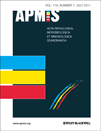Genetic polymorphisms of TP53-binding protein 1 (TP53BP1) gene and association with breast cancer risk
Abstract
Naidu R, Har YC, Taib NAM. Genetic polymorphisms of TP53-binding protein 1 (TP53BP1) gene and association with breast cancer risk. APMIS 2011; 119: 460–67.
In the present study, we evaluated the association between the TP53BP1 Glu353Asp and T-885G polymorphisms and breast cancer risk as well as with the clinicopathological characteristics of the patients. Genotyping of these polymorphisms was performed on 387 breast cancer patients and 252 normal and healthy women who had no history of any malignancy using PCR-RFLP method in a hospital-based Malaysian population. Breast cancer risk was not observed among women who were heterozygous (ORadj = 0.887; 95% CI, 0.632–1.245) or homozygous (ORadj = 1.083; 95% CI, 0.595–1.969) for Asp allele, and those carriers of Asp allele (ORadj = 0.979; 95% CI, 0.771–1.243). Similarly, women who were TG heterozygotes (ORadj = 1.181; 95% CI, 0.842–1.658) or GG homozygotes (ORadj = 1.362; 95% CI, 0.746–2.486) and carriers of G allele (ORadj = 1.147; 95% CI, 0.903–1.458) were not associated with increased risk of breast cancer. Asp allele genotype was significantly associated with ER negativity (p = 0.0015) and poorly differentiated tumours (p = 0.008), but G allele genotype was not associated with the clinicopathological characteristics. In conclusion, Glu353Asp and T-885G polymorphic variants might not have an influence on breast cancer risk, thus might not be potential candidates for cancer susceptibility. Glu353Asp variant might be associated with tumour aggressiveness as defined by its association with ER negativity and poorly differentiated tumours.




